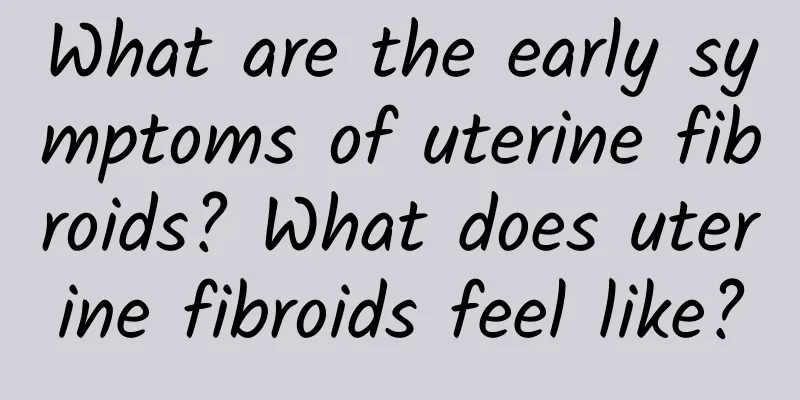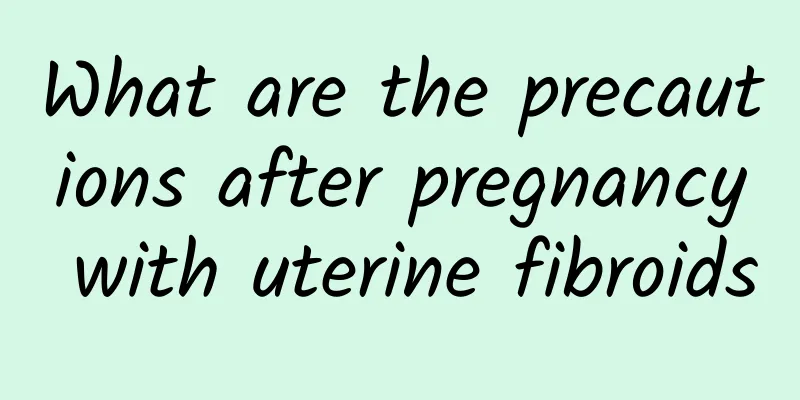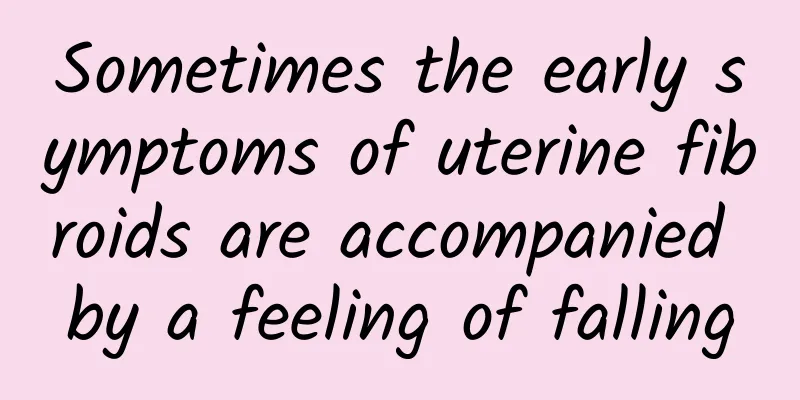What are the early symptoms of uterine fibroids? What does uterine fibroids feel like?

|
What are the early symptoms of uterine fibroids? Uterine fibroids are a type of tumor that occurs in the myometrium of the uterus. They are benign tumors that usually do not metastasize. Uterine fibroids are very common in women, especially in women of childbearing age. Although most uterine fibroids are asymptomatic, some cases may have some pre-symptoms in the early stages of development. Symptoms of uterine fibroids can vary depending on the size, location, and number of tumors. Here are some common symptoms: 1. Abnormal menstruation: If your menstrual cycle is irregular, such as prolonged menstruation, heavy menstrual flow, or abnormal increase in menstrual blood clots, then you may have uterine fibroids. The presence of tumors can cause menstrual blood to be unable to be discharged normally, thus causing abnormal menstruation. 2. Pelvic pain: When uterine fibroids grow in a certain part of the uterus or a larger tumor presses on the surrounding tissue, you may feel pelvic pain. This pain may be continuous or occur at regular intervals, such as during menstruation. 3. Difficulty urinating: Large uterine fibroids may put pressure on the bladder, causing difficulty urinating. You may find yourself needing to go to the bathroom more frequently, and you may also feel uncomfortable or painful when urinating. 4. Abdominal distension and oppression: The presence of uterine fibroids can cause abdominal distension, and you may feel a heaviness or oppression in your abdomen. This is because the tumor occupies a certain amount of space in the abdominal cavity. However, it should be noted that the above symptoms do not necessarily indicate that you have uterine fibroids. These symptoms may also be related to other gynecological problems. If you experience the above symptoms, especially if they persist, it is recommended to consult a doctor as soon as possible for diagnosis. What are the early symptoms of uterine fibroids? The symptoms of uterine fibroids may vary from woman to woman, and some women may not have any symptoms at all. The exact cause of uterine fibroids is unknown, but some potential risk factors include hormone imbalance, genetic factors, obesity, and age. Because the symptoms of uterine fibroids may be similar to other gynecological problems, a detailed physical examination and related tests by a doctor are required for diagnosis. Common diagnostic methods include pelvic ultrasound, MRI, endometrial biopsy, etc. Depending on the size, location and severity of the tumor, the doctor can develop a corresponding treatment plan. For those with mild symptoms, observation and regular checkups may be an option. When symptoms seriously affect the quality of life, or the tumor becomes larger and causes pressure on the bladder or rectum, surgical treatment should be considered. Surgical options include hysterectomy, myomectomy, etc. In addition, medication can be used to relieve symptoms. In short, the early symptoms of uterine fibroids can vary depending on the size, location and number of the tumor. Different women may have different symptoms, and some women may not have any symptoms at all. If you experience symptoms such as abnormal menstruation, pelvic pain, difficulty urinating, abdominal distension and pressure, it is recommended to consult a doctor as soon as possible for diagnosis and treatment. Only through the diagnosis and judgment of a professional doctor can you take appropriate treatment measures to protect your health. |
Recommend
What causes pain in the right ovary during menstruation?
What causes pain in the right ovary during menstr...
Experts briefly analyze the common treatment methods for ectopic pregnancy
Ectopic pregnancy is a gynecological disease that...
How to treat female vulvar itching
Women cannot ignore the self-care methods for pat...
Do you have the habit of "washing your butt"? Reminder: Regularly cleaning your anus may prevent these 5 diseases
Let me tell you a real case. Mary is a career eli...
Is pelvic peritonitis hereditary?
Pelvic peritonitis is a common gynecological dise...
Do you often feel uncomfortable or sprained in your feet when running? Runners must know! 5 common injuries and how to avoid them
Road running has become a part of modern people&#...
What are the preventive care measures for menopause?
Regarding the prevention methods of menopause, ev...
What causes poor ovarian function?
Ovarian dysfunction has a special impact on women...
How to care for pelvic peritonitis
In daily life, we should pay attention to the occ...
How much does it cost to test for endometrial tuberculosis?
Endometrial tuberculosis is the most serious type...
What to eat during pregnancy to prevent miscarriage
What can you eat during pregnancy to prevent misc...
Brazil is home to beautiful women! Breast enhancement and hip enhancement extend the beauty feast
If you have traveled to Brazil, you must have a d...
What are the tests for abnormal uterine bleeding?
There are many causes of abnormal uterine bleedin...
Will vaginitis in children cause low-grade fever?
Will vaginitis in children cause low-grade fever?...
How to treat uterine fibroids? Comprehensive treatment methods for uterine fibroids
When to treat uterine fibroids? The high incidenc...









